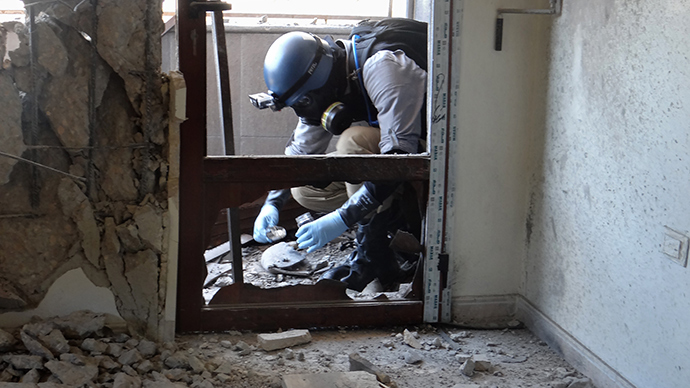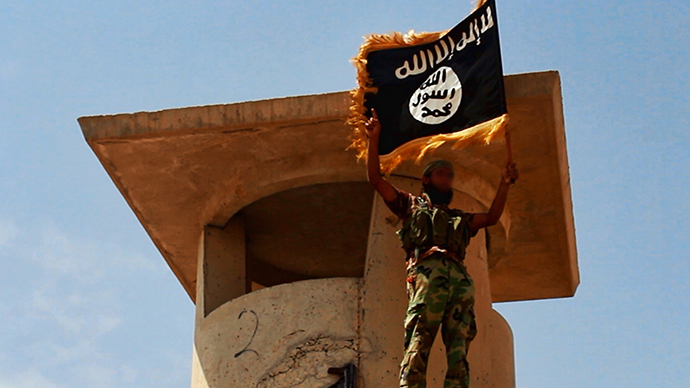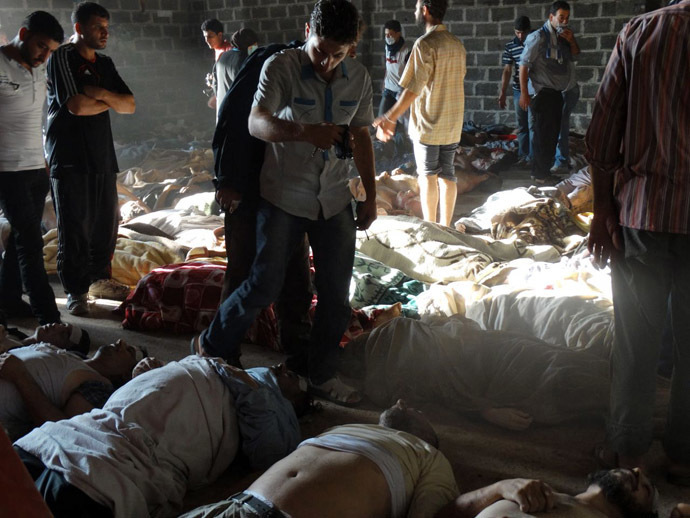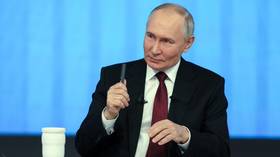Attack on Ghouta, 1 year on: ‘War is always main course for US’

This week marks the first anniversary of the infamous chemical weapons attack on the Damascus suburb of Ghouta.
What makes that incident significant, both politically and historically, is the fact that, despite the evidence of Syrian government involvement being non-existent, the Obama administration nearly began a war with Syria using Ghouta as the pretext.
As the months have passed however, scientific studies amassing an impressive body of evidence have shown that, not only were Washington’s claims of “certainty” that Assad’s forces had used chemical weapons in their war with extremist fighters utterly baseless, but in fact the reality was quite the opposite – the rebels were the most likely culprits of the attack.
Additionally, in the year since the Ghouta attack, the nature of the war in Syria, and specifically the way in which it is understood in the West, has changed dramatically. The so-called rebels have been defeated in regular battles and skirmishes with Syrian military forces, while the specter of ISIS has emerged as the embodiment of evil in the eyes of the Western public.
While ISIS (now the Islamic State, or IS) was summarily executing Syrian civilians in Aleppo and smaller towns in Syria, they were no threat. While they were merely destroying Christian and Shiite shrines, crucifying prisoners, and sowing terror throughout Syria, they did not constitute a serious problem.
However, now that the IS has emerged on the world stage, controlling parts of Syria and Iraq, and expanding into Lebanon, the equation on the ground in Syria has changed. With the West, in particular the United States, desperately seeking to reestablish a politically dominant position in Syria and delegitimize Assad and his government, the pretext for aggression has shifted from chemical weapons and Assad’s ‘butchery’ to the inescapable need to combat the IS.
Though conditions on the ground have changed in the last 12 months, the West’s agenda for Syria has changed very little. Regime change is still the name of the game.

Ghouta: Washington’s lies debunked
By the morning of August 22, 2013 – mere hours after the incident – the Western media had already tried and convicted Syrian President Bashar Assad for the chemical attack on Ghouta, which allegedly killed roughly 1,300 Syrians. Headlines around the world, such as “Syria’s darkest day? Opposition blames Assad forces as up to 1,300 killed in ‘poison gas attacks’” had already convinced the world that Damascus was behind the attack, that Assad was obviously a war criminal with a lust for blood, and that Western intervention was both necessary and morally justified.
Such was the tone of political discourse and rhetoric in the West following the attack. But then, a funny thing happened...people began questioning the validity of the claims and demanding irrefutable evidence.
I am happy to say that I was one of those people demanding that the US-NATO version of events be scrutinized carefully. In an article dated August 30, 2013, and titled ‘Debunking the US Government Assessment of the Syrian Government’s Use of Chemical Weapons on August 21, 2013’ I examined carefully the claims made by Washington that purported to establish undeniable proof that Assad’s forces carried out the attack. In the article, which provided a point-by-point refutation of Washington’s allegations, I wrote:
“Any critical reading of this document [the US Assessment] must begin with the notions of ‘human intelligence’ and ‘witness accounts’. Such terminology indicates that the US is simply basing pre-conceived conclusions on rebel sources and the much touted ‘activists’ who seem to always be the sources quoted in Western media reports. Secondly, it is obvious that US officials have cherry-picked their eyewitness accounts as there are many, from both sides of the conflict, which directly contradict this so-called high-confidence assessment.”
Just by examining the conclusions drawn by Washington at the time, it was abundantly clear that a political, rather than a forensic and evidenced-based, account of the events was being presented by the White House. However, the attempt to make war on Syria ultimately faltered for political reasons, and so, the story mostly fell away from the public spotlight.
In the subsequent months, multiple studies were in fact carried out to try to firmly establish the truth of what happened in Ghouta. In a comprehensive report released in January 2014 (more than four months after the incident), former UN weapons inspector Richard Lloyd and Prof. Theodore Postol of MIT effectively debunked the claims of the US government (along with Human Rights Watch and a number of other organizations), showing conclusively that US intelligence and conclusions regarding the incident were grossly inaccurate. The report, entitled Possible Implications of Faulty US Technical Intelligence in the Damascus Nerve Agent Attack of August 21, 2013, notes that:
“The Syrian improvised chemical munitions that were used in the August 21 nerve agent attack in Damascus have a range of about 2km…[The evidence] indicates that these munitions could not possibly have been fired at East Ghouta from the ‘heart’, or from the eastern edge, of the Syrian Government-controlled area shown in the intelligence map published by the White House on August 30, 2013…The UN independent assessment of the range of the chemical munitions is in exact agreement with our findings…this mistaken intelligence could have led to an unjustified US military action based on false intelligence.”

And so, once an honest, scientific investigation was conducted, the entire fabricated narrative with which Washington sought authorization to go to war in Syria was exposed as fraudulent. Unfortunately, by that point most of the world was no longer paying attention.
A few months later, in April 2014, Pulitzer Prize-winning journalist Seymour Hersh published his absolutely critical piece The Red Line and the Rat Line in which he wrote:
“The American and British intelligence communities had been aware since the spring of 2013 that some rebel units in Syria were developing chemical weapons…Defense Intelligence Agency issued a highly classified five-page ‘talking points’ briefing… which stated that Al-Nusra maintained a sarin production cell: its program, the paper said, was ‘the most advanced sarin plot since Al-Qaeda’s pre-9/11 effort…Previous IC [intelligence community] focus had been almost entirely on Syrian CW [chemical weapons] stockpiles; now we see ANF attempting to make its own CW … Al-Nusra Front’s relative freedom of operation within Syria leads us to assess the group’s CW aspirations will be difficult to disrupt in the future.’ The paper drew on classified intelligence from numerous agencies: ‘Turkey and Saudi-based chemical facilitators,’ it said, ‘were attempting to obtain sarin precursors in bulk, tens of kilograms, likely for the anticipated large-scale production effort in Syria.’”
So Hersh’s reporting finally firmly established the fact that the rebels were indeed capable of carrying out the attack on East Ghouta, and that they had help from Turkey, Saudi Arabia, and possibly other regional actors. And so, not only did they have the motive (to blame Assad for using chemical weapons while international investigators were in Syria, thereby justifying a military intervention and regime change), but also the means and opportunity. This is an essential point because the entire ‘case’ against Assad relied on the fact that only Damascus was technologically and logistically capable of carrying out such an attack. On the contrary, evidence has since come to light substantiating the claim from Damascus all along that the rebels indeed carried out the attack.
Why go into this history with the first anniversary upon us? Because it provides observers with a case study in how Western propaganda operates, how it works in synchronicity with the policy agendas of the Western powers, how it serves to suppress and/or distort facts in order to shape them to fit a pre-conceived narrative. They did, and continue to do, it in Syria. They’re doing it in Ukraine. They’re doing it in Iraq (not for the first time). It is predictable yet, sadly, many still fall for it.

How ISIS changed conversation, but not agenda
In the year since the Ghouta attack, the war in Syria has taken on a new dimension. With the rise to public infamy of the IS, the conversation around Syria has changed drastically. Before, the warmongers such as John McCain and others argued that the US must bomb Syria in order to effect regime change, ousting the ‘butcher’ Assad and replacing his government with one more amenable to Washington. Today, the same warmongers make the same tired arguments about the necessity of using military ‘intervention’ to fight the menace of the IS, an organization now controlling vast swaths of Iraq and Syria.
The gruesome video allegedly depicting American journalist James Wright Foley being executed by members of the IS has predictably elicited bellicose rhetoric from seemingly every corner of US political life. The unabashedly right-wing New York Post published an editorial entitled Time to Bomb ISIS in which the authors wrote, “[This incident] puts President Obama in a difficult spot. But the president must do whatever it takes to counter this vicious savagery: that is, launch full-throttled airstrikes against ISIS and its ‘caliphate’ in Iraq and Syria - until the threat is gone...With American lives now being taken and even more at risk, America is now directly involved. No more playing footsie with butchers.”
The editorial offers insights into the thinking of US imperialists who have been calling for US military action against Syria for more than a year, who supported the illegal US war on Iraq, and seemingly every instance of US aggression throughout the world, especially when initiated by Republican presidents. Indeed, a close reading of the above excerpt makes it clear that many in the US feel that the IS should be used as a pretext to ‘finish the job’, so to speak. “No more playing footsie with butchers” is a revealing statement, showing clearly that the vilified Assad must be destroyed via an operation against the IS.
Notice also that the authors make the appallingly ignorant statement that “America is now directly involved.” Naturally, these political observers must have been asleep for the past three years, as the US has been intimately involved in every phase of the destabilization of Syria. As the NYT reported back in June 2012, the CIA has been working extensively with the Syrian Muslim Brotherhood to funnel weapons, communications equipment, and other material support to the extremists in Syria fighting against the government of Assad.
Naturally, those weapons and materiel have been used to create and expand the terror group we now call the IS. And so, in a very direct way, the cancer spreading through Iraq and Syria is a US-NATO-GCC creation. But of course, according to the eminent American analysts at the NY Post and elsewhere, the US has been merely a sideline cheerleader, totally uninvolved in the chaos in the region. Whether these ‘experts’ are willfully ignorant, deliberately deceitful or genuinely stupid is certainly up for debate.
But, a look at the media coverage of the IS and the region in recent weeks does not bode well for the millions around the world who have simply had enough of US ‘interventions’ in the Middle East and beyond. The drumbeat for war is once again audible, as it was exactly one year ago with the incident in Ghouta. The more things change, the more they stay the same. Yesterday’s chemical weapons have become today’s IS threat.
Conveniently for Washington, no matter which way the menu is written, war is the main course.
The statements, views and opinions expressed in this column are solely those of the author and do not necessarily represent those of RT.
The statements, views and opinions expressed in this column are solely those of the author and do not necessarily represent those of RT.













